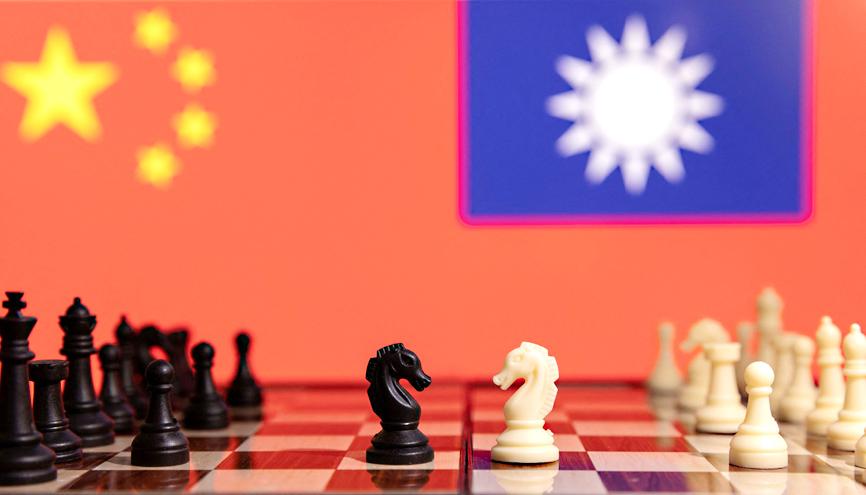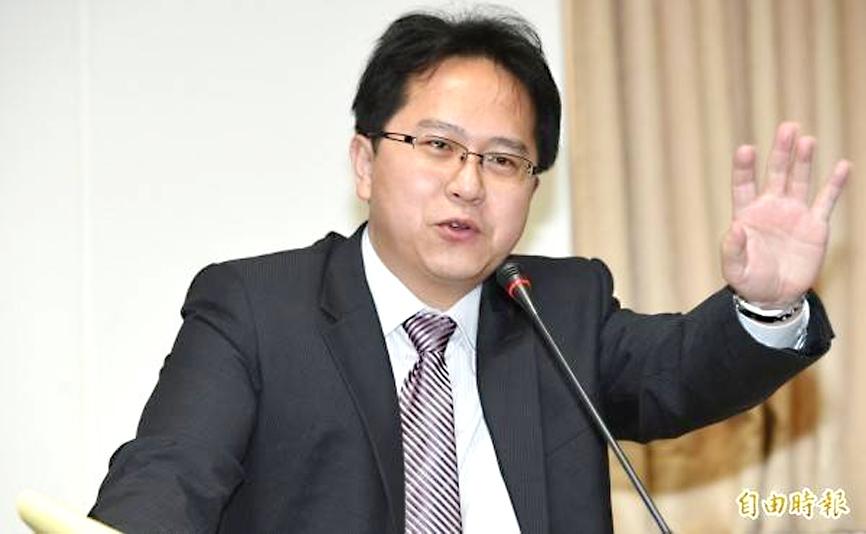Legislators have proposed amending the Anti-Infiltration Act (反滲透法) so that political parties found to have colluded with an enemy state to affect the outcome of an election can be dissolved.
The preamble of a draft amendment proposed by Democratic Progressive Party (DPP) Legislator Chiu Chih-wei (邱志偉) cited the UK’s MI5 security service as last year saying that Beijing has used Chinese agents to infiltrate all major British political parties, and was “engaging in political interference activities through donation of funds to influence policies on China.”
Australia has raised the alarm regarding similar activities.

Photo: Reuters
Under the Anti-Infiltration Act, political parties that have colluded with an enemy state to interfere in the outcome of an election can only be fined.
Chiu said that the Constitutional Court has the authority to order “the dissolution of unconstitutional political parties” if their goals or activities could endanger the nation’s existence and undermine the democratic constitutional order.
He cited Item 5 of Article 5 in the Additional Articles of the Constitution, Article 77 of the Constitutional Court Procedure Act (憲法訴訟法) and Article 26 of the Political Parties Act (政黨法).

Photo: Chung Li-hua, Taipei Times
Merely imposing fines would not deter a political party from colluding with an enemy state, so the Anti-Infiltration Act should be amended to include judgements by the Constitutional Court regarding the dissolution of a political party, Chiu said.
In related developments, the Ministry of the Interior has proposed amending the Political Parties Act so that a party can be dissolved if any of its members are found guilty of contravening either the National Security Act (國家安全法) or the Organized Crime Prevention Act (組織犯罪防制條例).
The ministry proposed the amendment after the China Unification Promotion Party (CUPP), founded by Chang An-le (張安樂), announced last year that it had established a “red squad” to advocate for unification with China and launch an armed insurrection.
However, lawmakers’ reactions varied, with some supporting severe penalties for those who contravene the National Security Act, while others said it could infringe on people’s right to form political parties and organizations, as granted under the Constitution.
Executive Yuan officials said further review would be needed, as the proposal would affect other legislation.
Chang was later charged with contravening the National Security Act. He was summoned for questioning by the High Prosecutors’ Office in March last year.
The case was transferred to the Taipei District Prosecutors’ Office, which dropped the charges in December last year, citing “insufficient evidence.”
Additional reporting by Jason Pan

MAKING WAVES: China’s maritime militia could become a nontraditional threat in war, clogging up shipping lanes to prevent US or Japanese intervention, a report said About 1,900 Chinese ships flying flags of convenience and fishing vessels that participated in China’s military exercises around Taiwan last month and in January last year have been listed for monitoring, Coast Guard Administration (CGA) Deputy Director-General Hsieh Ching-chin (謝慶欽) said yesterday. Following amendments to the Commercial Port Act (商港法) and the Law of Ships (船舶法) last month, the CGA can designate possible berthing areas or deny ports of call for vessels suspected of loitering around areas where undersea cables can be accessed, Oceans Affairs Council Minister Kuan Bi-ling (管碧玲) said. The list of suspected ships, originally 300, had risen to about

DAREDEVIL: Honnold said it had always been a dream of his to climb Taipei 101, while a Netflix producer said the skyscraper was ‘a real icon of this country’ US climber Alex Honnold yesterday took on Taiwan’s tallest building, becoming the first person to scale Taipei 101 without a rope, harness or safety net. Hundreds of spectators gathered at the base of the 101-story skyscraper to watch Honnold, 40, embark on his daredevil feat, which was also broadcast live on Netflix. Dressed in a red T-shirt and yellow custom-made climbing shoes, Honnold swiftly moved up the southeast face of the glass and steel building. At one point, he stepped onto a platform midway up to wave down at fans and onlookers who were taking photos. People watching from inside

Japan’s strategic alliance with the US would collapse if Tokyo were to turn away from a conflict in Taiwan, Japanese Prime Minister Sanae Takaichi said yesterday, but distanced herself from previous comments that suggested a possible military response in such an event. Takaichi expressed her latest views on a nationally broadcast TV program late on Monday, where an opposition party leader criticized her for igniting tensions with China with the earlier remarks. Ties between Japan and China have sunk to the worst level in years after Takaichi said in November that a hypothetical Chinese attack on Taiwan could bring about a Japanese

The WHO ignored early COVID-19 warnings from Taiwan, US Deputy Secretary of Health and Human Services Jim O’Neill said on Friday, as part of justification for Washington withdrawing from the global health body. US Secretary of State Marco Rubio on Thursday said that the US was pulling out of the UN agency, as it failed to fulfill its responsibilities during the COVID-19 pandemic. The WHO “ignored early COVID warnings from Taiwan in 2019 by pretending Taiwan did not exist, O’Neill wrote on X on Friday, Taiwan time. “It ignored rigorous science and promoted lockdowns.” The US will “continue international coordination on infectious